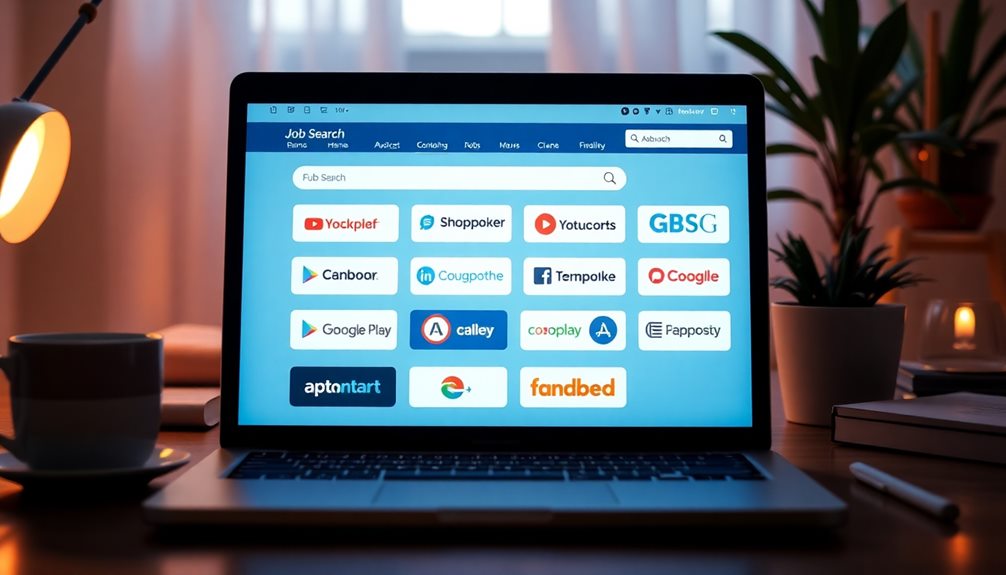Finding remote jobs with flexible hours is totally within your reach. Start by leveraging platforms like LinkedIn, FlexJobs, and Remote.co to explore opportunities. Focus on roles like virtual assistant or online tutor, as they often offer the flexibility you desire. Network with professionals in your field by joining online communities and attending virtual events. Keep your resume sharp and tailored to highlight relevant skills. Finally, stay organized with a job tracker and set daily goals. The journey to your perfect flexible role is just beginning, and you're about to uncover more tips and insights to make it happen!
Key Takeaways
- Utilize job platforms like FlexJobs and Remote.co to filter for remote positions with flexible hours.
- Highlight skills that align with flexible roles in your resume and applications.
- Join online communities and attend virtual events to network and discover hidden job opportunities.
- Set up job alerts on platforms to receive notifications for new flexible remote positions.
- Stay organized with a job application tracker to manage your search effectively and set daily goals.
Understanding Remote Work Opportunities

In today's digital age, understanding remote work opportunities is vital for carving out a flexible career path. The remote job market has exploded, offering a wealth of options that can fit around your lifestyle. Imagine waking up and deciding where and when you want to work, all while maintaining a sense of belonging to a global community. This isn't just a fantasy; it's the reality for many who've embraced remote careers. By joining communities that offer tailored training and networking opportunities, you can further enhance your chances of finding the right position and developing necessary skills in the process.
Unlock your potential to succeed in the remote job market.
The flexibility benefits of remote work are profound. You can choose hours that align with your peak productivity, whether you're an early bird or a night owl. This adaptability not only promotes better work-life balance but also allows you to manage personal commitments without stress. You'll find yourself more engaged and motivated when you can tailor your work environment to suit your needs.
But with so many opportunities available, it's critical to navigate this remote job market effectively. Start by identifying your skills and interests to target roles that resonate with you. Networking online and joining communities can provide invaluable insights and connections. Remember, the journey to finding the perfect remote job is just as important as the destination.
Embrace this new era of work, and don't hesitate to explore various avenues. With determination and the right mindset, you can create a fulfilling career that not only meets your professional goals but also enriches your personal life.
Identifying Flexible Job Roles

Finding the right flexible job role can feel like searching for a needle in a haystack, but it doesn't have to be overwhelming. The key is to focus on your strengths and interests while keeping an open mind about the diverse roles available.
As you delve into this journey, remember that many professions now offer flexible scheduling and remote options, allowing you to balance work with your personal life seamlessly.
Here are some job roles you might want to ponder:
- Customer Support Specialist: Engage with customers while working from anywhere, often with flexible hours.
- Content Creator: Use your creativity to produce videos, blogs, or social media posts on your schedule.
- Virtual Assistant: Support businesses or entrepreneurs with administrative tasks at your own pace.
- Online Tutor: Share your knowledge in subjects you love while choosing when to teach.
When identifying flexible job roles, think about what you enjoy doing and how it aligns with your lifestyle. Don't hesitate to explore industries you hadn't contemplated before.
Many companies are embracing remote work and understanding the importance of flexibility for their employees.
Stay persistent, network with others in your desired field, and seek out organizations that prioritize work-life balance. You'll soon discover that the perfect flexible job role is within reach, allowing you to thrive both professionally and personally.
Embrace this journey, and you'll find a role that fits your life beautifully.
Utilizing Job Search Platforms

Once you've identified the flexible job roles that resonate with you, the next step is to leverage job search platforms effectively. These platforms can be your bridge to opportunities that fit your lifestyle and career aspirations. Start by exploring different platforms like LinkedIn, Indeed, and specialized sites like FlexJobs or Remote.co. Each platform has its unique features, so don't hesitate to discover what works best for you.
When you set up your profile, be sure to highlight your skills and experiences that align with the flexible roles you're targeting. Use keywords related to remote work and specify your interest in flexible hours. This way, you'll increase your visibility to employers looking for candidates just like you.
While browsing, focus on targeting specific industries that excite you. Whether it's tech, marketing, or customer service, each industry has its own set of platforms and job boards. Tailoring your job search to these niches will help you find roles that not only fit your schedule but also align with your passion.
Don't forget to set up alerts for new postings that meet your criteria. This proactive approach keeps you informed without having to regularly check back. Remember, the right remote job is out there waiting for you. Stay motivated, keep refining your search, and embrace the journey of finding the perfect flexible position that makes you feel at home in your work environment.
Networking for Remote Positions

While many people think job searching is all about submitting applications, networking can often open doors to remote positions that aren't even advertised. Building genuine connections can give you insights and access to opportunities that you wouldn't find on job boards.
So, how do you effectively network for remote roles? Here are some practical steps to contemplate:
- Leverage LinkedIn connections: Start by reaching out to your existing network. Send a personalized message to your connections, sharing your career goals and asking if they know of any openings in their organizations.
- Attend virtual events: Participate in webinars, workshops, and networking events tailored to your industry. These platforms allow you to meet like-minded professionals and expand your network.
- Join online communities: Engage in forums and social media groups related to remote work. Contributing to discussions can help you establish your presence and make valuable connections.
- Follow up: After meeting someone, don't forget to follow up with a thank-you note or a message expressing your interest in staying connected. This can solidify your relationship and keep you on their radar.
Networking isn't just about asking for jobs; it's about building relationships that can support you in your career journey. When you invest in these connections, you create a sense of belonging in your professional community.
Crafting a Standout Resume

Creating a standout resume is crucial for landing remote jobs with flexible hours. In today's competitive job market, you want to make sure your resume grabs attention and showcases your unique skills.
Start with effective resume formatting. Use clean, professional layouts that make it easy for recruiters to read. Choose a simple font and maintain consistent spacing. Remember, less is often more!
Next, focus on highlighting achievements rather than just listing responsibilities. Quantify your successes to showcase your impact. For instance, instead of saying you "managed a team," say you "led a team of 10 to increase project efficiency by 30%." This not only demonstrates your ability but also shows potential employers how you can contribute to their goals.
Tailor your resume for remote positions by emphasizing skills suited for virtual environments, like self-motivation and strong communication. Highlight any relevant experience you have with digital tools or platforms.
Lastly, don't forget to include a brief summary at the top of your resume. This should encapsulate who you're and what you bring to the table, giving hiring managers a quick insight into your qualifications.
Tailoring Your Cover Letter

When you're applying for remote jobs, tailoring your cover letter can make all the difference in standing out to potential employers. A well-crafted cover letter not only showcases your personal branding but also highlights your unique communication skills. You want to connect with the reader, making them feel like you're the perfect fit for their team, even if you're miles apart.
Here are some practical tips to tailor your cover letter effectively:
- Research the Company: Understand their mission, values, and culture. This allows you to align your message with what they stand for.
- Highlight Relevant Experience: Focus on your past work that directly relates to the remote position. Mention specific projects that demonstrate your ability to thrive in a flexible work environment.
- Showcase Your Skills: Emphasize not just your technical skills, but also your soft skills like adaptability and time management—essential for remote work.
- Be Personal: Use the hiring manager's name and reference any conversations or connections you may have. This adds a personal touch that can set you apart.
Preparing for Remote Interviews

After crafting a compelling cover letter, the next step is to prepare for remote interviews, which can feel different from traditional in-person meetings. Embracing this new format can be an exciting opportunity to showcase your skills and personality from the comfort of your home. To set yourself up for success, start by mastering interview etiquette in a virtual environment. This includes dressing appropriately, maintaining eye contact through the camera, and minimizing distractions to create a professional atmosphere.
Ensure your technology is up to par; test your internet connection, camera, and microphone ahead of time. Familiarize yourself with the platform being used for the interview, whether it's Zoom, Skype, or another tool. This preparation underscores your commitment and adaptability, qualities that remote employers value.
Remote communication is key during an interview. Practice articulating your thoughts clearly and concisely, as it can be easy for nuances to get lost in translation.
Use active listening to engage with your interviewer, and don't hesitate to ask clarifying questions if something isn't clear. This shows you're not just passively participating but are genuinely interested in the conversation.
Leveraging Social Media

Harnessing the power of social media can greatly enhance your job search for remote positions with flexible hours. It's not just about applying to job postings; it's about actively engaging with potential employers and communities that align with your career goals. By leveraging social media platforms, you can effectively build connections that may lead to your dream job.
Here are some practical ways to use social media in your search:
- Connect with industry professionals: Reach out to people in your desired field. A simple "hello" can open doors to new opportunities.
- Utilize hashtags: Search for and use hashtags like #RemoteJobs or #FlexibleWork. This can help you discover relevant job openings and connect with like-minded individuals.
- Engage in conversations: Comment on posts, share insights, and participate in discussions. This not only showcases your expertise but also helps you become part of a community.
- Follow companies of interest: Keep an eye on organizations you admire. They often post job openings on their social media pages before listing them elsewhere.
Joining Remote Work Communities

Joining remote work communities can be a game changer in your search for flexible job opportunities. These communities foster a sense of belonging and support, making your journey less isolating and more collaborative. You'll find like-minded individuals who share similar aspirations and challenges, creating a vibrant network that you can tap into.
In these spaces, you'll discover a wealth of remote job postings that may not be advertised elsewhere. Members often share leads, giving you access to hidden gems in the job market. Engaging actively can lead to referrals, which notably increase your chances of landing a job. It's not just about finding a position; it's about building relationships that can propel your career forward.
Don't underestimate the power of networking events within these communities. They provide opportunities to connect with industry professionals and potential employers in a relaxed setting. Whether it's a virtual coffee chat or a webinar, these events can help you gain insights into what companies are looking for and how you can position yourself effectively.
Staying Organized in Your Search

Staying organized in your job hunt can greatly boost your efficiency and reduce overwhelm. When you're exploring the world of remote jobs, having a clear plan and structure is essential. Effective time management will help you allocate specific periods for job hunting, networking, and honing your skills. Here are some practical strategies to keep you on track:
- Create a job application tracker: Use a spreadsheet to record the jobs you apply for, their deadlines, and any follow-up actions needed. This helps you stay responsible and guarantees you never miss an opportunity.
- Set daily goals: Break your search into manageable tasks. Whether it's applying for two jobs or reaching out to one person in your network, these small victories are motivating.
- Utilize remote communication tools: Leverage platforms like Slack or Zoom to connect with peers and mentors. Sharing your journey can provide valuable insights and make you feel part of a supportive community.
- Schedule regular breaks: Don't forget to recharge. Incorporating breaks into your routine can enhance focus, making your search more efficient.
Frequently Asked Questions
What Industries Commonly Offer Remote Jobs With Flexible Hours?
When you explore remote job trends, you'll notice industries like tech, customer service, and marketing often offer flexible hours. These fields embrace flexible scheduling strategies, allowing you to balance work and personal life. By targeting these industries, you'll find opportunities that not only suit your lifestyle but also foster a sense of belonging.
How Can I Verify the Legitimacy of Remote Job Listings?
Exploring the wild west of remote job listings can feel challenging, but you've got the tools. Start by researching job platforms known for scam prevention, like reputable sites that filter out suspicious offers.
Cross-reference company reviews and look for contact information. Trust your instincts—if it feels off, it probably is.
Embrace remote job benefits by staying informed and using work from home tips to find genuine opportunities that foster belonging in your career journey.
Are There Specific Certifications for Remote Work Roles?
Yes, there are specific certifications that can enhance your qualifications for remote roles. Consider certifications in project management, digital marketing, or IT skills, as they demonstrate your expertise. Platforms like Coursera or LinkedIn Learning offer valuable courses. Earning these certifications not only boosts your confidence but also shows potential employers that you're committed to professional growth.
What Time Zones Should I Consider When Applying for Remote Positions?
You might worry that time zone differences will isolate you, but consider how time zone compatibility can enhance your remote team communication. When applying for positions, think about roles that align with your schedule, allowing for scheduling flexibility. Embrace cultural differences; they can enrich your experience and foster connection. Finding a balance means you'll contribute to a cohesive team while feeling a sense of belonging, no matter where you're in the world.
How Do I Maintain Work-Life Balance While Working Remotely?
Maintaining work-life balance while working remotely is essential for your well-being. Start by setting clear boundaries between work and personal time.
Prioritize time management to allocate specific hours for tasks and breaks. Don't forget self-care; take regular breaks to recharge.
Open communication with your team about your availability fosters understanding and support. Remember, it's okay to unplug and focus on yourself—you deserve it!
Finding that balance will enhance both your productivity and happiness.
Conclusion
In your quest for remote jobs with flexible hours, remember that about 70% of remote workers report increased job satisfaction. This statistic highlights the potential for a fulfilling work-life balance that flexible roles can offer you. Stay proactive, leverage your network, and refine your skills to stand out. With determination and the right strategies, you can find a position that aligns with your lifestyle and goals. Embrace the journey, and make your ideal work situation a reality!
